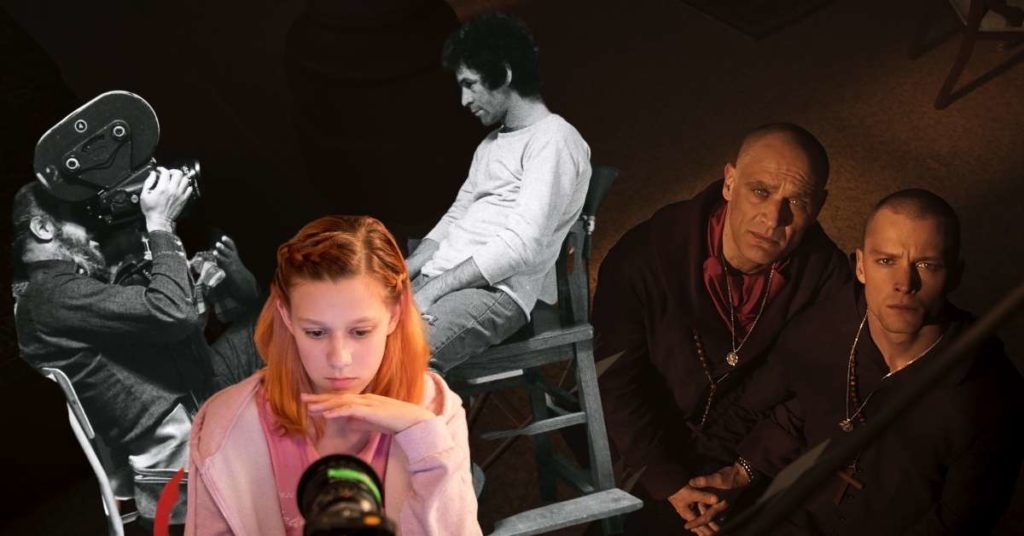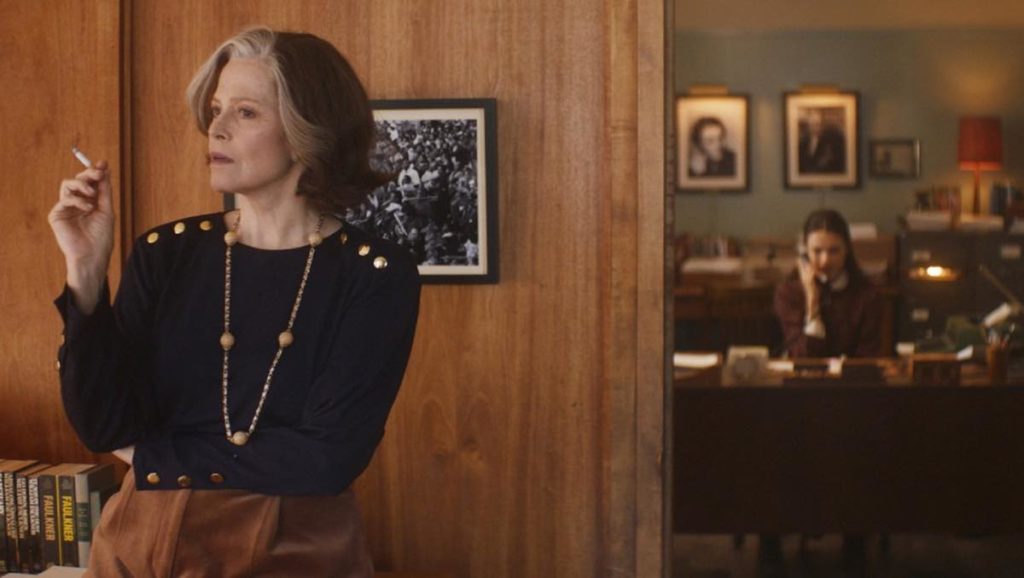The 2020 Festival du Nouveau Cinema showcased classics, like Les Ordres, and the latest in world cinema, from Undine to Caught in the Net to My Salinger Year.

Like so many other festivals this year, Montreal’s annual showcase for international cinema, Festival du Nouveau Cinema, went online — with the added benefit of being available across Canada for most of the month of October. This unprecedented level of access to the festival is incredibly exciting; it’s a festival with a history of showcasing the best of world cinema, as well as a large swathe of Quebecois and Canadian cinema often ignored by TIFF despite being of very high quality.
For better or worse, the move online also meant a large chunk of the program, originally intended for online screenings, was nixed, and the casualties were, by and large, some of the festival’s more accessible films, like the crowd pleaser Another Round. That meant that this year’s selection was dominated by the avant garde, which was a mixed blessing for an online film festival: it’s harder to focus on these films in your living room, but the lower barrier to access made it easier to give these films a shot, even if you decided they weren’t for you.
My experience with this year’s festival, admittedly, involved starting a lot of films, and finishing only a few. Jóhann Jóhansson’s Last and First Men had gorgeous black-and-white images of relatively mundane objects, which, through creative camera angles and an otherworldly Tilda Swinton voiceover, were transformed into alien environments. It’s the sort of film that would benefit from being seen in a dark room where you can’t just reach for your phone when you get a little fidgety, and yet also exactly the kind of film I probably wouldn’t have been willing to take a chance on and put in the effort to queue for. It wasn’t for me, but I probably wouldn’t have had the opportunity to sample it in a normal year.
Similarly, Kill It and Leave This Town featured incredibly beautiful and stylized animation but a somewhat abstract story, and a disconcertingly large number of breasts, left me confused and turning it off early. Meanwhile, one of only three Canadian selections, Sin La Habana, about a Cuban dancer who seduces a Canadian tourist in search of an escape from the country, was a bit of a disappointment. I made it halfway through this visually vibrant and colourful film with a fairly retrograde and predictable plot, before deciding I couldn’t quite manage the rest of it. I tried with Dau Natascha but it’s the kind of bleak, relatively slow cinema that you can get through in a room full of people at a festival, and have trouble forcing yourself to plod through at home — even if it might be rewarding.
Les Ordres screened for free at the 2020 Festival du Nouveau Cinema

Despite the large number of sampled and abandoned films, one of the highlights of this year’s festival was the opportunity to catch some rare restorations. Since October marked the 40th anniversary of the October FLQ Crisis, the festival screened two films from the ‘70s about the crisis, both available free across Canada, but only streaming for 24 hours. I missed the window for Octobre, not realising that it would be coming and going so quickly. But I did catch up with the groundbreaking docudrama Les Ordres, a chilling look at when Quebec became a police state and people were arrested without proof, and then held in prison for days (and tortured) without being charged. Les Ordres is both a crucial part of our national history, despite the film’s removal of the political context from what happened, and a film that helped put Canadian cinema on the international map with its Cannes win in 1974.
Out of the Blue

The festival also screened the restoration of Dennis Hopper’s Out of the Blue, which has been making the rounds at various festivals since Venice last year. It’s a bizarre artifact: a Canadian film, shot in Vancouver, with a Canadian crew and mostly Canadian cast, that wound up being directed by Hopper, a last-minute replacement, into a piece of American mythology. Hopper was initially cast in a supporting role in the film, which he still holds, in what was supposed to be a largely Canadian production, but when the original director left, Hopper stepped in. Though not quite my tempo, the film is certainly proof that the American influence on English Canadian cinema (and the weird relationship we have with bringing in American stars for our films) is certainly not something new, and it’s also a relatively rare document of 1980 Vancouver.
My Salinger Year

After making the rounds at provincial film festivals across the country, Philippe Falardeau’s My Salinger Year was showcased as the closing night film at the festival — available only for a few hours. It was unfairly panned as the opening night film at Berlinale back in February, perhaps because it’s a film so clearly meant to entertain without any aspirations as high cinema — essentially, what you’d expect from an opener. Its treatment by critics feels similar to when Atom Egoyan’s perfectly entertaining if not great Captive became the punching bag of Cannes.
Although My Salinger Year is hardly Falardeau’s best or most interesting film, it does sport his trademark light touch; the similarity of its setup to The Devil Wears Prada, a much showier film, probably did it no favours. Margaret Qualley stars as Joanna, an aspiring writer who gets a job at one of the oldest literary agencies in New York City, and finds herself in charge of answering J.D. Salinger’s fan mail — and occasionally, chatting with him on the phone. Unlike Miranda Priestley, Joanna’s boss (the luminescent Sigourney Weaver) is not a dragon lady so much as a no-nonsense career woman happy to mentor her employee, while always keeping a professional distance. My Salinger Year is light and rather forgettable fluff, but I enjoyed every minute of it; sometimes, you just need light entertainment.
My Salinger Year will be released across Canada in November and December.
Caught in the Net

A film that I kind of grudgingly finished was the documentary Caught in the Net in which three adult actresses are hired to pretend to be 12-year-olds on the internet and respond to communications from predatory men. To say the film’s ethics are dubious would be an understatement, with the actresses spending 10 hours a day for a week dealing with abuse without much emotional support that we see. It comes as little surprise when, a few months later, we discover one of them still has nightmares from the trauma she experienced during the week. Although the film does successfully expose just how prevalent Men On The Internet In Search of Sexual Relations With Children are, as well as some of their grooming tactics, the ‘study’ is both completely unscientific and probably harmful to all of the women involved. Although some men were apparently apprehended based on the footage shot, the exploitativeness of the filmmakers ends up being just as prominently on your mind as the exploitation from the Men On the Internet.
Caught in the Net is still an acquisition title.
Saint-Narcisse and Undine

Two of the highlights of the festival, for me, would have made for a great double feature of films that reimagine old myths in modern day settings. In Saint-Narcisse, Bruce LaBruce ponders what would happen if Narcissus’s reflection in the pool actually came to life, in the form of an identical twin. A mixture of camp and melodrama, this gorgeously made film is also one of the funniest I’ve seen this year, and surprisingly sensitive to taboo topics.
By contrast, Christian Petzold’s Undine tackles the Ondine myth of the mermaid who leaves the sea, falls in love, is betrayed, and must go back to the sea. Transporting the story to modern-day Berlin in Undine, Petzold uses the myth to tell a love story set against the backdrop of a city that has changed on the surface, but changed very little in other ways since the Third Reich. The kind of rebirth and repeated cycles of Ondine map nicely onto the story of German historical amnesia: same place, same people, same problems, but dressed up as something different. Although Undine is less effective as a meditation on German history than Petzold’s other films on this subject (Barbara, Phoenix), there are some fascinating ideas explored that I suspect will benefit from a second viewing.
Saint-Narcisse and Undine will be released in Canada in 2021.
Never miss a chance to see the latest great festival films again
Stay in the know with the Seventh Row newsletter
Subscribers to our FREE newsletter get an email every Friday which details some of the best new streaming options in Canada, the US, and the UK.

